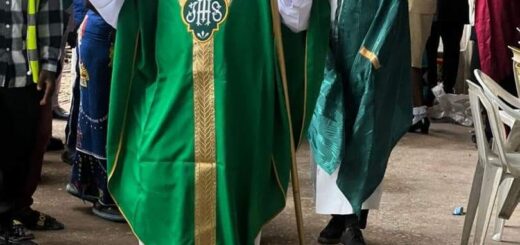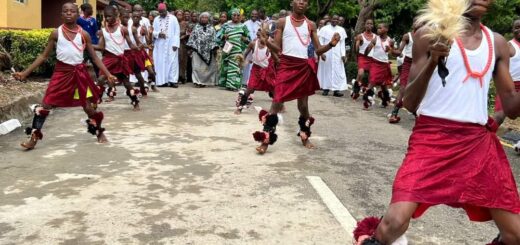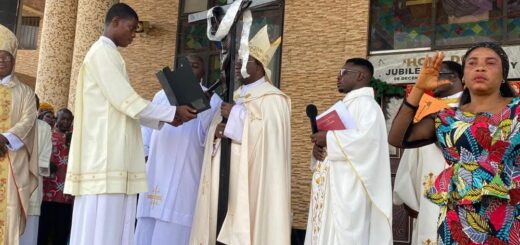The Power of God’s Word
by ARCH BISHOP · July 16, 2023
15th Sunday in Ordinary Time, Year A, St. Peter’s Pastoral Area, Idu Karmo, Abuja, 16.07.2023. Homily by Archbishop I. A. Kaigama
Readings: Is. 55:10-11; Rom. 8:18-23; Mt. 13:1-23.
The Power of God’s Word
My dear people of St. Peter’s Pastoral Area, Idu Karmo, it is a joy for me to make my first pastoral visit to you, to pray with you and to bless you. It has long been my desire to visit you, but God made it possible only today.
Fr. Thomas Omiunu tells me of the tremendous efforts you have made since the inception of your pastoral area. I commend you all and call on you to continue to unite and to support him in the best way you can so that your church will witness even faster growth and progress.
On the fifteenth Sunday of ordinary time, the Church urges us to open our hearts so that the word of God can take root in them. Our first reading from Prophet Isaiah contains a message of hope and consolation to the exiled Israelites: “As the rain and snow come down from the heavens and do not return without watering the earth…so the word that goes from my mouth does not return to me empty without carrying out my will and succeeding…” (Is. 55:10-11).
The word of God is creative, transforming, healing, redemptive, etc., and so, we are asked to open ourselves to it to nourish and enrich our lives. When we allow the Word of God to permeate the depths of our being, it becomes a lamp to our feet and a guide to our path (cf. Ps. 119:105).
The word of God has the power to change hearts (including the hearts of kidnappers, murderers, and offenders against humanity); it can make them shed their sinful ways and embrace the journey of faith by finding better ways of navigating through the challenges of life.
The second reading taken from St. Paul’s letter to the Romans tells us that creation has been wounded by the effects of sin (cf. Gn. 3:17). He compares creation with the labour pains of a woman. Just as a woman perseveres through the pangs of labour, we too must endure hardship and uncertainties that come with bringing forth the kingdom of God in the here and now. It requires us to step out of our comfort zones and persevere in promoting the culture of life, the culture of peace, the culture of friendship, etc.
Working for our nation where equity, justice, peace, and love can flourish is demanding. We must not allow the harsh economic times, endemic corruption, insecurity, and wounds of violent conflicts extinguish our hopes for a better Nigeria. Rooted in the word of God we are hopeful for a nation where unhealthy competition is replaced by cooperation, hostility gives way to hospitality, ethnic and religious bigotry succumb to a culture of inclusivity. We must be determined to do the right things at all levels. Students must work hard and be awarded the results they deserve; people should be civil, learn to be disciplined and orderly in public gatherings; job seekers should gain employment based on merit, promotions should come to deserving workers, etc.
Only if we are sound Christians we can contribute to making Nigeria a better place. In the parable of the seeds, the seeds that fell at the edge of the path represent Christians, who do not understand God’s word at all and do not live up to their Christian identity. The seeds that fell on the rocky path represent the Christians who receive the word of God with joy but are easily overwhelmed by trials and do not stay strong in their faith convictions. The seeds that fell among thorns are those who are distracted by worldly pleasures after receiving the word.
They are the “prosperity hunters” enslaved by the pursuit of material gains at the detriment of their souls (cf. 1 Tim. 6:10). The seeds that fell on the good soil represent those Christians who receive the word of God with joy and allow it to influence their lives and decisions. They hold fast to the faith that they have received, and resist being overwhelmed by worldly desires. This type of people can help in repairing Nigeria.
Jesus employed the parable of the sower to speak to our fast-secularizing contemporary world where God’s word seems to have lost meaning; where man has become too intelligent, that he wants to create artificial intelligence, and so, the word of God no longer nourishes his personality or shapes his way of life.
Even with the so-called scientific and technological progress, we are encouraged to read, study, pray, meditate on the word of God so that we will bear good fruits, in thirty, sixty, hundred folds and more. What a difference it would make if politicians, professionals, private citizens, who profess faith in God allow His word to be the determining factor in their lives! Rather, we see God as some kind of a policeman to whom we run only when we are in trouble. The problem is not the sower neither is it the seed, the problem is the soil, and the soil represents us human beings, the receivers of the word of God. Some are afraid of the word of God because it is an obstacle that stops them from carrying out evil deeds, but for those who accept it for what it really is, it is alive in their actions.
St. Paul made it clear in the second reading that the mission of spreading the word of God is not easy. It comes with a lot of sacrifices and pain. It is our prayer that the word of God will continually be a source of our nourishment and hope as we make efforts to accept, understand, live, and spread it.




